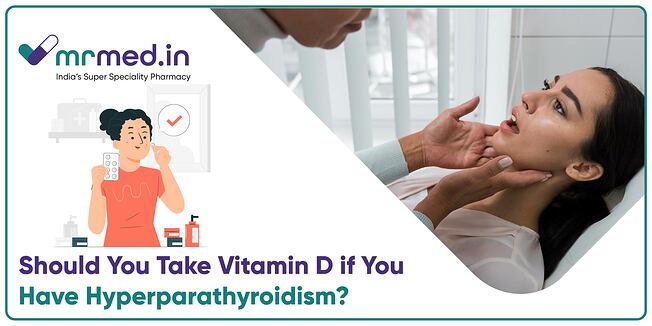mrmedonlinepharmacy: Are You Taking Vitamin D with Hyperparathyroidism? Read This First!
If you’ve been told to take vitamin D while managing hyperparathyroidism, hold on a second. It might not be as simple as “pop the pill and carry on.” The relationship between vitamin D and this tricky condition is more complicated than most think. Before you swallow your next supplement, let's clear up the confusion with facts that every thyroid and parathyroid patient should know.What is the Role of Vitamin D in the Body?Vitamin D helps your body absorb calcium, keeps bones strong, and supports immune function. It's like a multitasker that keeps your body in check. But when it comes to hormone imbalances like hyperparathyroidism, it needs to be handled carefully.Can Vitamin D Make Hyperparathyroidism Worse?That depends. In primary hyperparathyroidism, your parathyroid glands produce too much hormone. This can lead to high calcium levels. Now, adding vitamin D without checking your calcium can increase the risk of complications. Vitamin D helps absorb even more calcium from food, which may worsen the imbalance.On the other hand, if you’re low on vitamin D and you don’t fix that, your parathyroid glands may work overtime. So it's about balance, not avoidance.Should You Take Vitamin D with High PTH Levels?It’s not a straight yes or no. High PTH levels (parathyroid hormone) usually indicate the body is trying to compensate for low calcium or low vitamin D. But in cases where calcium is already high, like in primary hyperparathyroidism, vitamin D must be used cautiously.Doctors often recommend a blood test to check vitamin D, calcium, and PTH levels before starting any supplement. Based on those results, they may adjust the dose or delay it altogether.How Much Vitamin D is Safe to Take?The safe dose varies from person to person. Many experts suggest starting with low doses like 400 IU to 800 IU per day if you're deficient. But again, your calcium and PTH levels must guide this decision.Taking mega doses without supervision can be dangerous. Always follow your endocrinologist’s advice, not just a generic label.Are There Natural Sources of Vitamin D?Absolutely! If you want to boost your vitamin D without taking pills, try these natural options: Sunlight: Just 15–30 minutes a day helps. Foods that are high in vitamin D include fatty fish, egg yolks, and fortified cereals. Mushrooms exposed to sunlight are also a great vegan source. These options help maintain a gentle balance, especially if your condition is being monitored closely.What Foods Should You Avoid with Hyperparathyroidism?Limit foods high in calcium, especially if your blood levels are already elevated. These include: Full-fat dairy Tofu Sardines with bones Also, steer clear of vitamin D-enriched food if your doctor has advised caution.Can You Take Other Supplements with Vitamin D?It’s common to take calcium along with vitamin D, but not always ideal for hyperparathyroid patients. Taking both together could send your calcium levels soaring. Magnesium may be suggested instead, especially if you're deficient.Before mixing supplements, ask your doctor or a qualified dietitian for a plan tailored to you.What are the Symptoms of Vitamin D Deficiency in Thyroid Patients?Tired all the time? Achy bones? Feeling down or depressed? These could be signs of low vitamin D, which is common in people with thyroid disorders. That’s why thyroid and parathyroid health often overlap when it comes to vitamin D therapy.Still, don’t self-diagnose. A simple blood test can tell you exactly where you stand.How Do Medications Help in This Condition?In some cases, doctors prescribe PTH 30mg tablet that contains Cinacalcet to control calcium levels by mimicking calcium in the blood. This tricks the parathyroid glands into slowing down hormone production. It’s especially helpful in secondary hyperparathyroidism or in those who can’t undergo surgery.But this medicine isn’t a replacement for lifestyle changes or careful vitamin D monitoring.Is There a Link Between Thyroid Disorders and Parathyroid Issues?Yes, but it’s often misunderstood. Though the thyroid and parathyroid glands are neighbours in the neck, they have very different jobs. Still, thyroid conditions may increase your chances of discovering parathyroid issues, especially when symptoms overlap.Many patients diagnosed with thyroid conditions later learn about PTH imbalances or vitamin D issues. That’s why routine checks are key.What are the Facts About the Thyroid and Vitamin D Connection?Here are some facts about thyroid what we know: People with thyroid disease often have low vitamin D3. Scientists believe vitamin D plays a role in autoimmune thyroid conditions like Hashimoto’s. While this link is still being studied, keeping your vitamin D within range can support thyroid health.It doesn’t mean more is better, just enough to support hormone function and bone strength.A Few Final Thoughts Before You SupplementTaking vitamin D while managing hyperparathyroidism isn’t wrong, but it’s not one-size-fits-all. Whether you starting any new treatment or you're adjusting to a new diagnosis, your vitamin D levels should be checked and guided by a healthcare expert.Your body has its own rhythm, and playing with hormones needs more than guesswork. Always test, don’t guess. Let your treatment plan be guided by facts and tailored to you.

